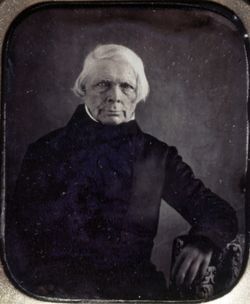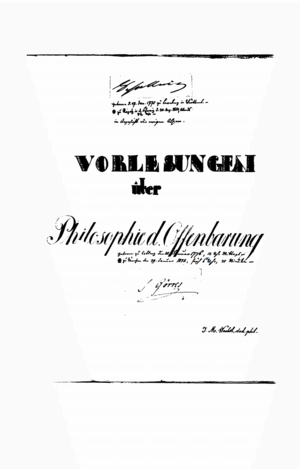Schelling's Philosophy of Revelation: A Critical Edition of the Original Lectures
The Project
Friedrich Wilhelm Joseph von Schelling (1775-1854) has long been recognized as one of the great philosophers of the German tradition, alongside Kant, Fichte, and Hegel, his roommate together with the famous poet Hölderlin, in the Tübingen Stift (the state seminary of Württemberg). In The Spirit of Modern Philosophy, the American idealist, Josiah Royce (1855-1916), called him the “prince of romanticists and the poetic seer of splendid metaphysical visions.” After Schelling’s famous 1809 essay on human freedom, however, the young philosopher fell silent, publishing nothing more until his death in 1854, and so it is in 1809 that the standard narrative of Schelling’s contribution to the history of philosophy tends to end. What motivates our project is what this great philosopher had to say in his lectures during the last decades of his life, and in particular what he had to say in his 1831/32 lectures on the philosophy of revelation, which he began to deliver in the same year that Hegel died. Not only do these lectures mark Schelling’s decisive break with Hegel and, arguably, the entire tradition of German idealism in which Schelling himself played such a prominent role; he himself considered these lectures to be the culmination of all his thought hitherto – which is all the more remarkable when one considers the countless systems and drafts of systems his thought went through.
Accordingly, the goal of our project, building on the important scholarly work of the past century, is to produce the first comprehensive critical edition in English – or, indeed, in any language – of Schelling’s Original Version of the Philosophy of Revelation, and thereby make it possible for the Anglophone world finally to assess the merits of Schelling’s late – and perhaps best – philosophy.
Why Schelling?

The simplest reason is Schelling’s undisputed importance to the history of ideas as one of the great modern philosophers (in Heidegger’s words, “Schelling is the truly creative and boldest thinker of this whole age of German philosophy”): from his invigorating philosophy of nature, to his Romantic celebration of the poet and the artist, to his role as, arguably, the father of modern existentialism and psychoanalysis, given his emphasis on human freedom, the irreducibility of the will, and the dark depths of the unconscious, which Sean McGrath, one of our collaborators, has explored in The Dark Ground of Spirit: Schelling and the Unconscious (Routledge, 2012). To be sure, Schelling was for a time overshadowed by Hegel, in part because Hegel’s system was more fit for consumption than Schelling’s countless systems and drafts. But the times have changed – so much so that, in the words of eminent British literary theorist Terry Eagleton, Schelling has shot to something like “philosophical stardom.”
Schelling’s Late Philosophy
After his 1809 essay, Schelling’s late philosophy began to get worked out in three drafts of his Ages of the World (1811, 1813, 1815), the middle of which was first published in English translation in 1997. At its core, this late philosophy turns upon a fundamental distinction between what he calls “positive” and “negative” philosophy. Whereas the latter concerns what reason can grasp a priori and can therefore be systematized, the former begins from the assumption that logic alone is inadequate to the real – the “indivisible remainder” – and is fully rational only when it is ecstatically open to what transcends it. On the basis of this distinction between positive and negative philosophy, Schelling then turned in his Erlangen lectures (1821, 1824, 1830) to the subject of mythology as the material presupposition of revelation – indeed, as a kind of proto-revelation – and finally, in his 1831/32 lectures, to the subject of revelation proper.
Why these lectures?
Among the many reasons for an edition of these lectures, aside from the importance that Schelling himself attached to them, is that they represent one of the profoundest attempts of any modern or contemporary philosopher to wrestle with the meaning of history, human consciousness, mythology, human freedom, and the problem of evil. Moreover, we know of no other thinker (modern or contemporary) to have wrestled as profoundly as Schelling did in these late lectures with the question of the nature and significance of religion (both in itself and in relation to modern public life), and specific claims of revelation.
Take, for instance, the doctrine of the Trinity and what Hegel made of it. In these lectures Schelling provides a thoroughgoing response to Hegel precisely with regard to the Trinity. The result is arguably the most sophisticated attempted hitherto to explain this central doctrine, free it from Hegel’s interpretation of it, and pave the way for renewed thinking about it. And something similar goes for the whole history of religion: at every turn Schelling is at pains to explain the positive meaning of religion and its ongoing importance both to philosophy and the modern world. For all these reasons we believe these lectures could help to facilitate not only inter-confessional and inter-religious dialogue, but also deeper interdisciplinary dialogue about the role of religion in the modern world and the relationship between philosophy and religious studies in particular.
At the same time, Schelling’s 1831/32 lectures are of extraordinary historical, cultural, and political interest. Not only do they represent what is arguably the peak of his thought; they also and precisely mark the end of an age – since Hegel died in 1831, and Goethe in 1832, signifying the end of German idealism and German classicism, respectively. In other words, these lectures were given at a defining moment in German intellectual history – and in some sense for the West in general. For with the death of Hegel, the era of “the system,” and of confidence in the power of reason to master reality, was for all intents and purposes over. The power of reason, which was supposed to be the bedrock of modern society (after the purifications of Kant’s critique of pure reason), was itself now in question.
How, then, did Schelling perceive the situation? Did he see a way through reason’s crisis and the apparent end of the rationalist project that began with Descartes and reached its apogee in Hegel? Did he see a way to salvage reason by understanding it within the larger context provided by revealed religion, and thereby save the credibility of both the religious and intellectual tradition of the West? For years he had seen the cracks in Hegel’s system. Did he see a way to contain the fall-out, so to speak, after Hegel’s system broke apart, leaving German intellectual, political, and cultural life ominously divided between the older traditionalists and the younger radicals? Specifically, did he see a way to overcome the differences between the right-wing Hegelians who saw in Hegel’s system the definitive triumph of reason, whose purposes had been fulfilled in the Prussian state, and the left-wing Hegelians (from Feuerbach to Marx) who emphasized the necessity of war and revolution in order for history to be fulfilled? These are just some of the profound questions raised by these lectures.
The Need for a Critical Edition

Our own edition will be based upon the German edition of Walther Ehrhardt, which was first published by Felix Meiner Verlag in 1992 as the Urfassung der Philosophie der Offenbarung, i.e. the original version of the Philosophy of Revelation. There is, however, a complicated background to the publication of this edition, beginning with the fact that in 1841 Schelling delivered a reprise of his 1831/32 Munich lectures ten years later in Berlin. As Ehrhardt and other scholars realized, however, there were problems with the received text of Schelling’s Berlin lectures that made them unreliable, to wit, they are a patchwork of manuscripts edited by Schelling’s son, K.F.A. Schelling, who also had a free hand in their final composition. Complicating matters, the Berlin lectures at first circulated in a bootleg version by Schelling’s nemesis, the Heidelberg theologian H.E.G. Paulus. And evidence suggests that this version ended up figuring into the final version of the Berlin lectures. In short, all of this makes the 1841/42 Berlin lectures an unreliable source for Schelling’s philosophy of revelation.
Fortunately, however, owing to good research skills and a stroke of luck, Ehrhardt discovered the original Munich lectures at the library of the Catholic University of Eichstätt, where they had been improperly catalogued. Although the manuscript is not from Schelling’s own hand, but from that of one of his students, Joseph Maximilian Wachtl (1809-1882), Ehrhardt determined that it was in all likelihood dictated by Schelling to Wachtl, since it includes Schelling’s own corrections. For these and other reasons Ehrhardt concluded that the Wachtl manuscript was the manuscript that Schelling intended either for publication or for Joseph Görres (whose signature is curiously found on the title page). Following Ehrhard, therefore, and the consensus of most scholars today, we plan to take the Wachtl manuscript, as transcribed by Ehrhardt, as the base text of our translation.
Our Edition
There is much room for improvement upon the Ehrhardt edition, however, Firstly, the Ehrhardt edition comes with a far too modest introduction (it is in fact an epilogue), which does not put the lectures in their proper context or explain them. Our own introduction will be far more robust, attempting to make the late Schelling accessible to a contemporary Anglophone audience. Secondly, as Ehrhardt himself admits, his annotations are “minimal” and do next to nothing to assist the reader’s comprehension of the lectures. In our view, this is a serious omission given the difficulty of Schelling’s thought and vocabulary, not to mention the wealth of allusions to ancient sources in Greek, Latin or Hebrew, which needed to be translated. In addition to a sizeable introduction, own translation will therefore be richly annotated, providing necessary clarifications of Schelling’s thought and concepts, elucidations of obscure allusions, explanations for various translation decisions, and translations of terms and quotations in other languages. Thirdly, improving on the Ehrhardt edition, our own edition will draw upon two other manuscripts of the lectures, which are held at the Bavarian State Library: one by Hubert Beckers and another, amounting to approximately 600 pages, by a student of Schelling named Helmes. These manuscripts offer a helpful and illuminating comparison with the Wachtl manuscript, even though they do not supersede it. Fourthly, the edition will also include a more expansive and updated bibliography of primary and secondary sources and a far more detailed index of persons, subjects, and biblical references.